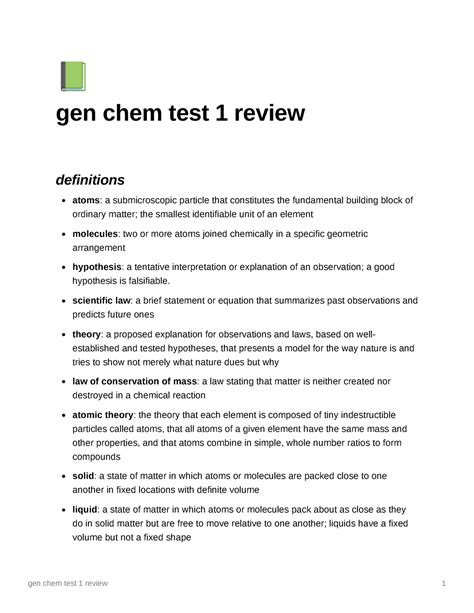Introduction

General Chemistry 1 (Gen Chem 1) is a fundamental course that lays the foundation for understanding the world of chemistry. It covers a wide range of topics, including atomic structure, chemical bonding, chemical reactions, and thermodynamics. Given its importance, excelling in Gen Chem 1 is crucial for students pursuing various STEM disciplines.
Why Gen Chem 1 Matters
- Stronger Foundation for Future Courses: Gen Chem 1 provides a solid foundation for advanced chemistry courses such as organic chemistry, inorganic chemistry, and biochemistry.
- Improved Problem-Solving Skills: The concepts and principles taught in Gen Chem 1 enhance students’ ability to solve complex problems in science and engineering.
- Career Opportunities: Gen Chem 1 opens doors to careers in fields such as medicine, pharmacy, research, and environmental science.
How to Ace Gen Chem 1
1. Attend Lectures and Take Notes
- Make sure to attend all lectures and take comprehensive notes. This will provide a solid framework for understanding the material.
2. Read the Textbook
- The textbook is an invaluable resource that provides detailed explanations and examples. Read the assigned chapters before and after lectures.
3. Practice Regularly
- Gen Chem 1 involves a significant amount of problem-solving. Practice regularly by completing assigned problems and quizzes.
4. Seek Help When Needed
- Don’t hesitate to ask your professor or teaching assistant for help when you encounter difficulties. They are there to support your learning.
5. Utilize Study Groups
- Joining study groups can provide a collaborative learning environment and reinforce concepts through discussions and problem-solving sessions.
Tips and Tricks
- Focus on Understanding Concepts: Memorization is not enough. Focus on understanding the underlying concepts and how they connect.
- Break Down Problems: Large problems can seem overwhelming. Break them down into smaller steps to make them more manageable.
- Use Visual Aids: Diagrams, charts, and graphs can help visualize complex concepts and aid in comprehension.
- Utilize Online Resources: There are numerous online resources, such as Khan Academy and Crash Course, that provide clear and engaging explanations.
- Take Advantage of Office Hours: Office hours allow you to interact with the professor on a more personal level and clarify your understanding.
How Gen Chem 1 Benefits Your Future
- Improved Career Prospects: Gen Chem 1 is a requirement for a wide range of STEM-related careers, including medicine, pharmacy, and engineering.
- Scientific Literacy: Understanding Gen Chem 1 concepts enhances scientific literacy and allows you to make informed decisions about issues related to science and technology.
- Problem-Solving Ability: The problem-solving skills developed in Gen Chem 1 are applicable to various real-world situations.
- Critical Thinking: Gen Chem 1 fosters critical thinking skills, which are essential for success in any field.
Conclusion
General Chemistry 1 is a vital course that sets the stage for a deeper understanding of chemistry and related fields. By following the strategies outlined above, you can excel in Gen Chem 1 and unlock a world of scientific opportunities.
Key Concepts in Gen Chem 1
1. Atomic Structure
* Number of protons, neutrons, and electrons
* Isotopes, atomic number, and atomic mass
* Electron configuration and periodic trends
2. Chemical Bonding
* Covalent bonding: Lewis structures, VSEPR theory
* Ionic bonding: formation, properties, and solubility rules
* Intermolecular forces: hydrogen bonding, dipole-dipole interactions
3. Chemical Reactions
* Types of reactions: acid-base, redox, precipitation
* Balancing chemical equations
* Stoichiometry: mole ratios and conversion factors
4. Thermodynamics
* Energy changes in chemical reactions
* Enthalpy and entropy
* Gibbs free energy and spontaneity
Useful Tables in Gen Chem 1
Table 1: Types of Chemical Reactions
| Type | Definition |
|---|---|
| Acid-Base | Reaction of an acid and a base |
| Redox | Transfer of electrons between atoms or ions |
| Precipitation | Formation of an insoluble solid |
| Combustion | Reaction with oxygen, releasing heat and light |
Table 2: Common Acids and Bases
| Acid | Formula |
|---|---|
| Hydrochloric acid | HCl |
| Sulfuric acid | H2SO4 |
| Nitric acid | HNO3 |
| Acetic acid | CH3COOH |
| Base | Formula |
| — | — |
| Sodium hydroxide | NaOH |
| Potassium hydroxide | KOH |
| Calcium hydroxide | Ca(OH)2 |
| Ammonia | NH3 |
Table 3: Solubility Rules
| Ion | Solubility in Water |
|---|---|
| Na+, K+, NH4+ | Soluble |
| Ca2+, Ba2+, Mg2+ | Mostly insoluble |
| F-, Cl-, Br-, I- | Soluble |
| SO42-, CO32-, PO43- | Mostly insoluble |
Table 4: Bond Lengths and Energies
| Bond | Bond Length (Å) | Bond Energy (kJ/mol) |
|---|---|---|
| C-H | 1.09 | 413 |
| C-C | 1.54 | 347 |
| C-O | 1.43 | 360 |
| C-N | 1.47 | 305 |
